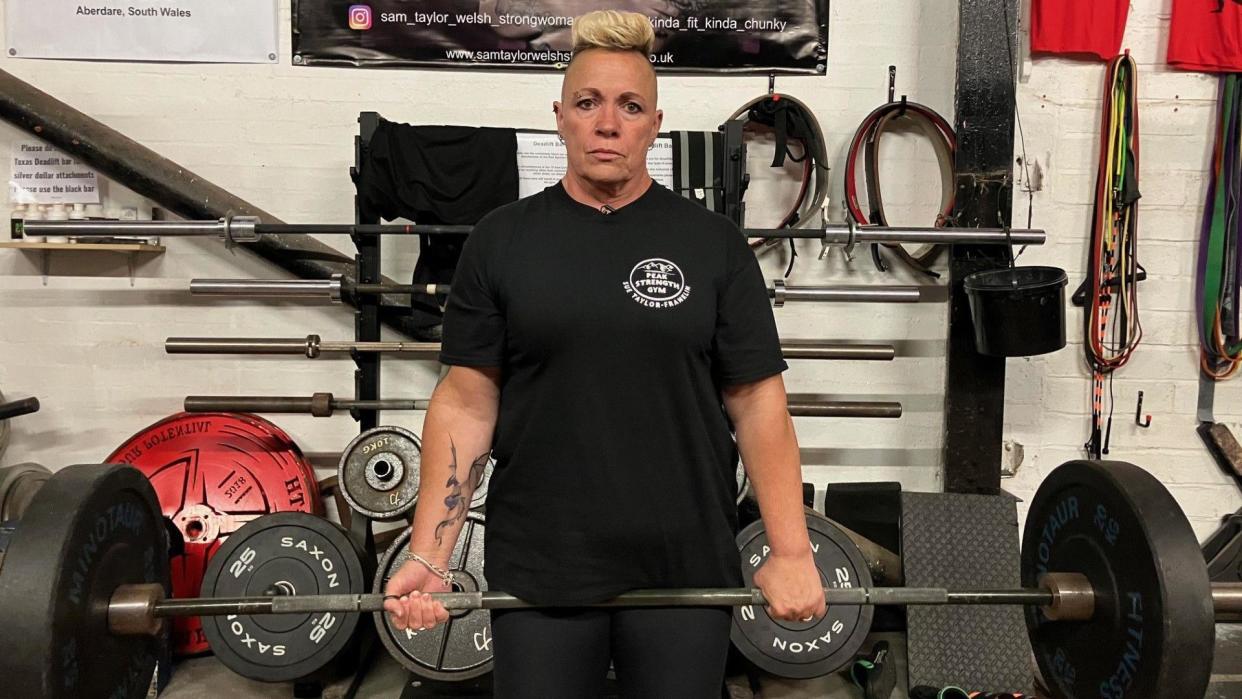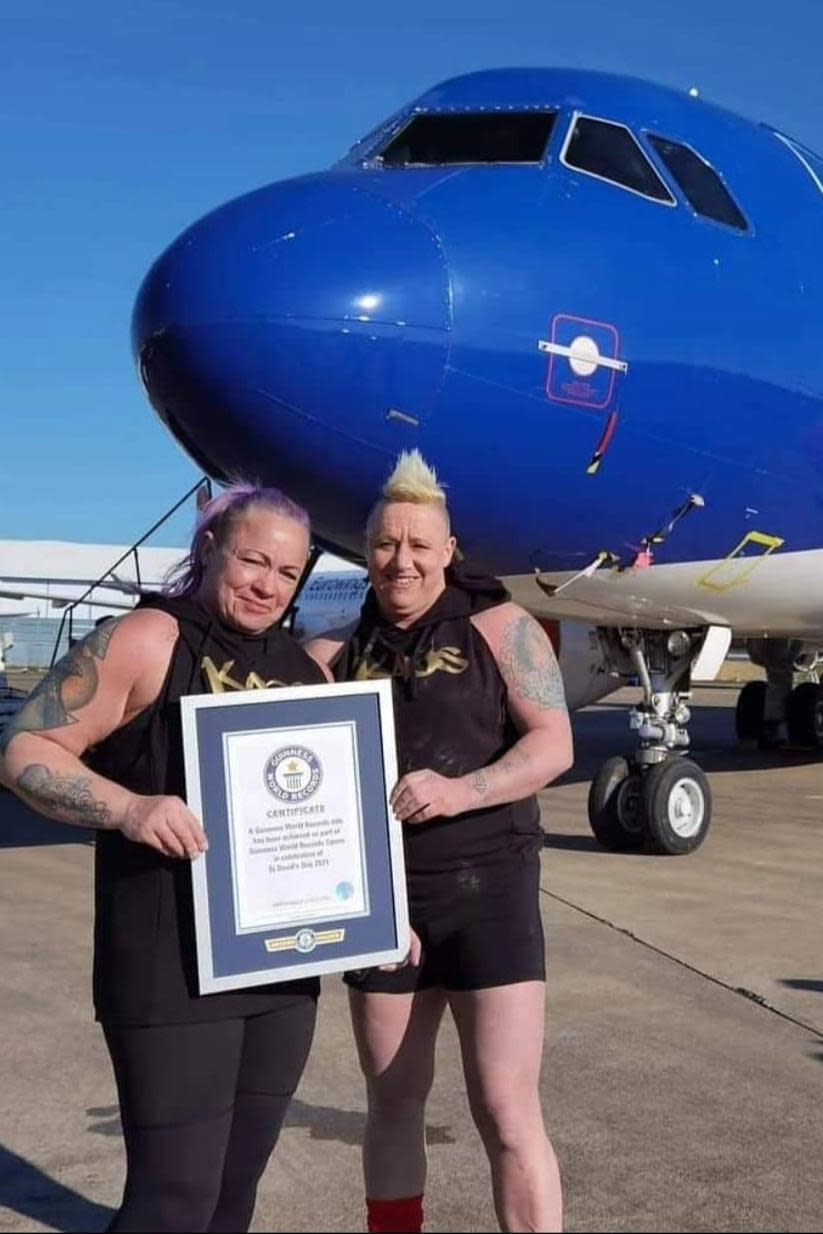Champion powerlifter faced five-year NHS wait

Sue Taylor-Franklin is striving, once again, to be one of the strongest women in the world.
At her peak, the 56-year-old could deadlift almost a quarter of a tonne and even broke a world record by pulling a 48-tonne aeroplane with her wife Sam.
But the powerlifter, from Aberdare, Rhondda Cynon Taf, found her career in jeopardy when a knee injury she sustained in a motorbike accident as a 17-year-old flared up at the end of 2021 and she was told there was a five-year waiting list on the NHS.
After turning to online crowdfunding she was able to afford a £10,000 operation in Lithuania - but her experience means she now believes the UK's health services need an overhaul because she "couldn't get the help when I needed it".
Sue's knee would swell most days and she was unable to walk very far as the bones were "so worn down I knew needed an operation".
She said: "We've got a 13-year-old son and a puppy but I couldn't do anything because the pain was through the roof.
"On a scale between one and 10 it was 15."
After having a private scan, she was told at the start of 2023 that she would not get surgery before 2028.
With her mental health suffering and an increasing dependency on strong painkillers, Sue found a clinic in Lithuania offering the treatment for £10,000, but she couldn't afford it.
"We looked at options of getting loans, getting credit cards and maxing them out, but we'd only recently had a mortgage on our house," she said.
So Sam turned to a crowdfunding website in March 2023 and, in part due to support from the powerlifting community, their target was reached in just five weeks and she had surgery that September.
"I was really humbled, I mean the money came from all over the world - America, Norway, Japan... as well as Britain," said Sue.
Experiences like Sue's are not uncommon in Wales, with about one in five people on an NHS waiting lists for planned treatments and, on average, waiting 46% longer than in England.
The difference between the longest waits is even starker.
There are more than 20,600 cases in Wales of someone waiting more more than two years compared to just 275 in England.
These figures have been seized upon by the Conservatives, Plaid Cymru, Lib Dems, Reform and others to attack Labour's record on health in the nation where it has been running the NHS for 25 years.

But are the criticisms fair?
"Given that two-year waits have been reduced to a very low level in England, not so much in Scotland, it does seem you'd be much more likely to wait that period in Wales," says Mark Dayan of the UK independent health think-tank the Nuffield trust.
"But to some extent that flatters England a bit because England hasn't necessarily made quite so much progress in reducing waiting times across the board."
The policy analyst said waiting lists were not "the only things that matter".
He added: "I'm not sure there are clear indications that the actual clinical quality of care in Wales is any different or worse or better. And that really is the ultimate standard by which you judge health system."
Independent experts also point out that simple comparisons don't take into account that Wales' population is, on the whole, older, poorer and sicker than across the border, meaning an extra burden on the NHS.
Nor do they consider differing policy choices - such as prioritising patients based on clinical need.
Lengthy waiting lists in Wales not only pre-date the Covid pandemic but also devolution itself, so it's long-standing problem.

The Welsh Labour government also suggested that, on measures such as four-hour waits in big A&E departments, its performance has been better than England for 15 of the past 20 months.
It also highlighted that 15% more is spent in Wales per head on health and social care than in England.
Health is devolved - so whoever wins this election won't be in charge of the Welsh NHS.
But decisions made in Westminster about how much to spend on England's public services likely determine how much money comes to Wales and, as a result, could influence future Welsh health policy.
In this election each party claims it knows how to make the NHS fitter for the future but the Nuffield Trust suggested most parties were underestimating the scale of the financial challenges.
"We have not learned a lot about health spending in this election, all the parties have been really trying to pledge as little additional money as they can while making some quite big promises about what they'll achieve," said Mr Dayan.
Back from Lithuania and back in the gym - although not ready to lift the very heaviest weights just yet - Sue's making solid progress but worries the NHS is heading in the opposite direction.
She said: "I'd worked 41 years of my life, always paid my tax... but I couldn't get the help when I needed it.
"I think they need to shut the NHS down and start all over again... I don't see any way that it can come back from where it is. It needs a complete overhaul.
"I think it's in such a dire strait that whichever party gets in isn't going to be able to fix it. I don't think it's fixable."
Thanks to the generosity of others, Sue has been able to fix her knee and is eager to break more powerlifting records.
But she is worried the NHS - not just in Wales but across the UK - is broken beyond repair.
If you would like to hear more about election issues in Wales and get the chance to have your say you can sign up to the BBC's live audience programmes here.


